#we used to pretend we were batman and robin in elementary school
Text
currently partnered with an old childhood friend for class but i think she forgot who i am
#im. a little sad now#like... she just doesn't remember me but i remember her so so well#i know her name and i know what her favorite color used to be and i know that she's an only child#we used to pretend we were batman and robin in elementary school#she's one year older than me and i remember feeling heartbroken when she went to middle school before i did#i remember how we used to get mad at other kids for making fun of our fucked up teeth and we'd hype each other up to get over it#we were best friends#but she just. doesn't remember me. she doesn't know my name and she doesn't know how old i am and she doesn't remember our old friendship#im a stranger to her but she isn't a stranger to me and its weird#ik this is weird to say but. i dont like having a really good long term memory because of stuff like this.#i remember all of my old friends in detail but im lucky if any of them remember me. i remember things everyone else has already forgotten.#i walk through the hallways and i know so many people but id be shocked if even ONE of them knew who i was#it just hurts a bit. i have all these fond memories of all these people but none of them are mutual
4 notes
·
View notes
Text
Black and Blue
Read it on AO3
Prompt: “bruises”
TW for domestic violence, physical abuse, harm to children. Please read responsibly.
Summary: Bruce Wayne never expected his children to come to him whole. But he never expected Tim Drake to be so bruised.
(Or, Batman saves the boy who saved him)
Bruce never expected his children to come to him whole.
Dick had calluses and impacted musculoskeletal growth, along with an anger Bruce wasn’t sure would ever be sated. Jason was malnourished and coping with PTSD, and had scars with more history than most developed nations. But of them all, he expected Tim to be the least shattered; he’d grown up in the lap of luxury after all.
He never expected Tim to be so bruised.
_________________
Tim was a smart kid, no doubt about that. Years ago, Bruce had taken a look at his records: straight A’s since kindergarten, fluency in three languages and working on a fourth, an IQ of 142. He wasn’t Lex Luthor, but it was impressive for a kid of just 13. Especially a kid who never seemed to stay in one place for long.
Tim’s school records revealed more than just his intelligence. He was taught by an au pair until kindergarten, then went to a private elementary school just outside Gotham for three years. From third to fifth grade he was enrolled at Gotham Academy as a boarder. Middle school was spent at another boarding school in Gotham, but he was allowed home on weekends. He’d start freshman year at a public school, Louis E. Grieves Memorial, the upcoming September.
Bruce didn’t pretend to know everything about child psychology, but he was sure that repeated upheavals were bad for any child, let alone one who was smarter than most of his classmates to begin with. He didn’t even want to think about Tim going to a public school in a few weeks.
It was the reports from Tim’s teachers that made Bruce hesitate the most:
Timothy struggles with connecting to other classmates.
Timothy stayed indoors during recess, claiming a stomach ache. When asked if he wanted to play with the others, he shook his head and went back to reading.
Timothy is a pleasure to have in class, but the school mandates that parents must sign off on permission slips, rather than nannies.
Timothy’s roommate frequently complains about Timothy’s nightmares. The Drake family doctor has prescribed sleeping aids to help the problem.
Timothy came back from his weekend at home with a black eye and multiple new surface injuries. He insists he fell while skateboarding.
It didn’t take a detective to know that Tim was being bullied. He was a skinny kid with gelled-up hair and an affinity for math. As Tim himself once put it, he was “every coming-of-age movie’s nerd who gets shoved into a locker.” That didn’t make it any better.
Bruce hadn’t realized that he was at the Drakes’ house until his knuckles stalled an inch from the door. The limo that hauled the Drakes around wasn’t in the driveway. This wasn’t a wellness check, it was a nice walk that ended in seeing his newest sidekick. That was an excuse he could live with.
He rapped twice: two loud, short knocks that seemed to echo. Not a minute later, he could hear locks clicking on the other side of the door, and there was Tim--all 5’2” of him.
It wasn’t Tim’s short stature or gelled hair that made Bruce’s heart sink, though. It was the bruises that caressed his jaw and temple that almost ended in a black eye. His nose was bruised, but Bruce didn’t think it was broken. Probably. The bruises were fresh, less than 24 hours old. Tim had been beaten up recently.
“Who did this to you?” He tried to ask gently, but it came out too harsh and too breathy all at once. Bruce reached out for Tim’s shoulder, but the young teenager avoided him with ease, like it was a practiced movement.
“‘S not important,” Tim mumbled, his tone achingly adolescent.
“I know you’re getting bullied, Tim. I know it’s been going on for a long time. I need you to tell me who it is so they can see consequences.” Bruce had never done this before. He’d saved kids from hostage situations and from the creepy guy on the playground. But he’d never had to save kids from other kids.
Instead of breaking down in tears like Bruce expected, Tim barked a short laugh.
“I’m not getting bullied, B. I’m Robin, do you seriously think Tyrone Wright bothers me anymore? Not to mention, I never have to see him again. He’s going to Gotham Academy next year.”
“Then who-” Bruce’s sentence fell apart as his mouth caught up with his mind. Fresh bruises. Not another kid. The Drakes left this morning.
Oh.
“Tim,” he began slowly, “did your father do this to you?”
Tim’s demeanor dropped immediately, and he wouldn’t look Bruce in the eye. Seconds passed without a response, and for a second Bruce could painfully feel how, in this moment, they were Batman and a scared child.
“He didn’t mean to,” Tim finally let out, his voice as quiet as a dying breath.
Worry churned in Bruce’s stomach. Those words were never a good sign.
“I need you to explain everything that happened last night, okay?” Bruce said, as gently as he could while his heart was breaking. “Do you want to talk here, or at the Manor?”
Instead of answering, Tim slipped back into the house, leaving the door open for Bruce to follow. Bruce crossed the threshold, and took in the Drake mansion. It was full of that post-modern, minimalist decor that Bruce despised. It looked sterile, like a museum or a morgue. It certainly didn’t look like a place that housed a 13 year old boy.
Tim led him past the foyer and the formal sitting room and into the kitchen, where he selected a stool at the island. The counters were marble and impeccably clean. The cabinets were glass and white-painted wood. It looked like something out of a magazine. Pictures lined the walls, but they were all landscapes of foreign lands. Bruce couldn’t spot a single family photo.
“Where are your parents? I thought they were supposed to be in Gotham for at least another week,” Bruce began, but he truly didn’t care that the Drakes were gone. Good riddance.
“They left this morning for Haiti. Some big dig started early and they couldn’t miss it,” Tim whispered, his tone much wetter than it had been a few minutes before. “We were supposed to have a big going-away dinner, but I was playing my music too loud and didn’t hear my dad when he called. He came in and saw me just sitting on my bed and told me to stand up. S-so I did and he slapped m-” Tim’s sentences were barely-suppressed sobs now.
“He hit you so hard you bruised?” Bruce prompted, frowning. “Has he done this before?”
“N-no. To both. I wasn’t ready and I fell and hit my head on my desk. It’s not like that’s what he wanted to happen.” Tim had managed to choke down the tears, and was now staring solemnly at Bruce. It was as if he’d learned to quiet his sorrow as quickly as possible.
“Tim…” Bruce murmured, but he could barely get the words out over the pain of his heart splintering. “You didn’t deserve that. It’s not your fault. Your dad shouldn’t have hit you. No adult should hit a child, ever.”
Tim stared at the countertop, but remained silent. Bruce reached out to pat him on the back, but when his hand brushed Tim’s shoulder, Tim flinched. Bruce didn’t try to touch him again after that.
“Okay, here’s what we’re going to do,” he finally said, putting on the voice he used as Batman. “We’re going to go to the manor, take a look at your injuries, and watch some movies. Alfred will buy us those ice cream cookie sandwiches if we ask nicely. That sound good?”
Tim nodded mutely and pushed himself off the stool.
“Okay, what do you need to pack to stay at the Manor? Clothes, obviously--maybe a speaker?”
“He broke mine. Before he hit me.” Tim mumbled.
Bruce froze, just for a second. “Well, we’ll have to fix that. How about we get you a new WayneTech phone? You can download music onto it, and I’ll get you some earbuds too.” Bruce followed Tim as the boy wove his way through the house, all the way up to his room. It was starkly bare, with a few posters and knick knacks but not much else. Tim shoved clothes into a duffel bag, did a quick survey, then looked at Bruce.
“Ready.”
That’s it? It was shocking how easily Tim could pick himself out of this life, like he was a piece of lint on a fancy suit.
Still, Bruce smiled. “Then let’s go. I’m thinking Star Wars for the movies, how about you?”
Tim quipped something about how Star Trek was superior in every way, but all Bruce could think about were his other sons. It hadn’t even been six months since he’d lost Jason, but he was already letting another child in. He wasn’t going to let another little boy slip through the cracks.
And when the Drakes came home from Haiti, he would show them no mercy.
#whumptober 2020#my writing#abuse tw#domestic violence tw#physical abuse tw#bruise tw#jack drake is a rat bastard abuser and i hate him#batfam#tim drake#bruce wayne#batman#robin
27 notes
·
View notes
Text
The LEGO Batman Movie (2017), Logan (2017), and The Fate of the Furious (2017)

Trailer

Trailer

Trailer
I’m at an age where many of my friends have become or will become parents. Since I was the first person in my peer circle to become a father, they sometimes turned to me to ask what advice, practical or philosophical, I could give about becoming a parent. By this point, I’ve refined my patter to a performance. I will consistently tell my friends, “Don’t have kids.” Either that draws them in further to inevitably ask why, or they take the words on the superficial level and move on with the conversation. If they ask why I, a father of a delightful kid, would say that, I ask if they want the practical or the philosophical reasons. The practical reasons are simple: having a child is a major financial commitment, a guarantee that you will never have a sound night of sleep ever again (and not just because an infant’s needs will interrupt your sleep), and a turning point in the relationship that you and your partner have. You and your partner’s relationship may not survive; the roles that you and you partner played in the relationship before you became parents will not be the roles that you will play after. The philosophical reasons are based in pessimism: if we accept that any actions that lead to the suffering of others is immoral, then having a child is an immoral act because human sentience means that we all live in constant pain born from a terror of knowing that our lives are finite. We are always dying. We die every second. In response to the absurd notion that we are born only so we can live to know that we will die, the most common options are: commit suicide, embrace the absurdity of life, or to recognize how absurd life is and rebel. How could you then morally justify creating life?
What could have been in the creative air to inspire three major blockbuster films (The LEGO Batman Movie, Logan, and The Fate of the Furious) from three different distributors (Warner Brothers, 20th Century Fox, and Universal Pictures, respectively) to tackle the ideas of family unity and fatherhood in three different ways? (And it’s noted that these three films offer their takes on fatherhood specifically, not parenthood.) I suppose it’s natural that someone will explore the paradoxical idea that characters like Batman and Wolverine, who are so often defined as loners who don’t believe that they deserve human connections to other people would actually have many relationships that form an extended family with characters who choose to be with them. In other words, you could imagine Batman, Wolverine, and Dominic Toretto each saluting their respective families with their beverages of choice.


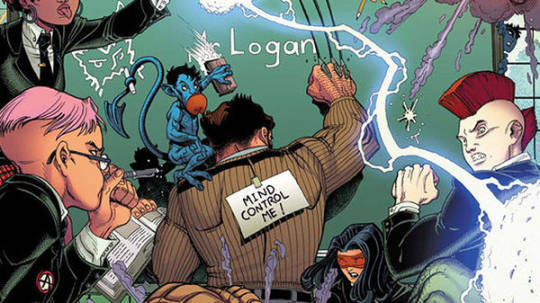
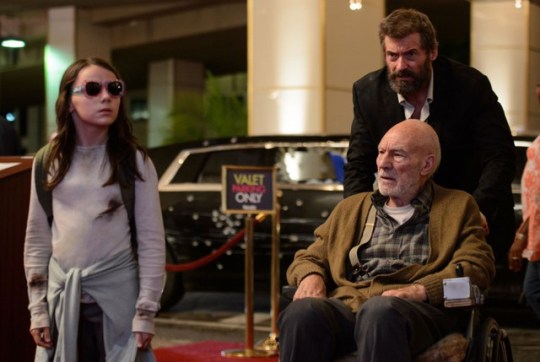
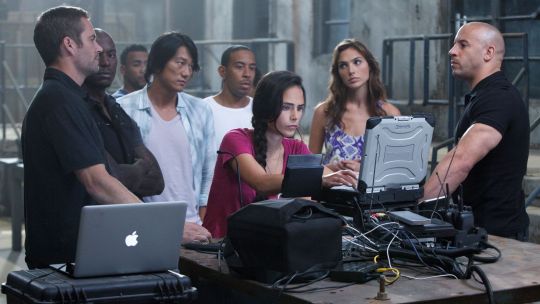
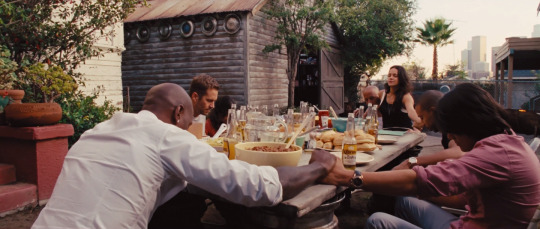
Colorful and bombastic, The LEGO Batman Movie contextualizes the characters around Batman as his extended family. From Alfred the patriarch (voice by Ralph Fiennes) to Batman (Will Arnett) to Batman’s adopted son, Robin (Michael Cera), to Batman’s co-dependent nemesis, the Joker (Zach Galifianakis), to Batman and Joker’s extended work friends and acquaintances like Harley Quinn (Jenny Slate), Barbara Gordon (Rosario Dawson), and Clayface, the many bonds that Batman has with the world around him are highlighted in bright neon explosions. As Batman’s surrogate father and like a father who worries about his kid’s ability to make the right kind of friends at school or meet the right partner, Alfred worries about his charge’s ability to form social bonds that will sustain Batman if he were to ever die.

The film’s inciting incident is Batman breaking the Joker’s heart by telling him that he means nothing to him; the movie ends with a play on romantic comedy beats by climaxing with Batman and the Joker telling each other that they hate each other. It’s the psychosexual dynamic between the two that Frank Miller famously explored in The Dark Knight Returns and Scott Snyder years later in “Death of the Family” sanitized for the elementary school set.

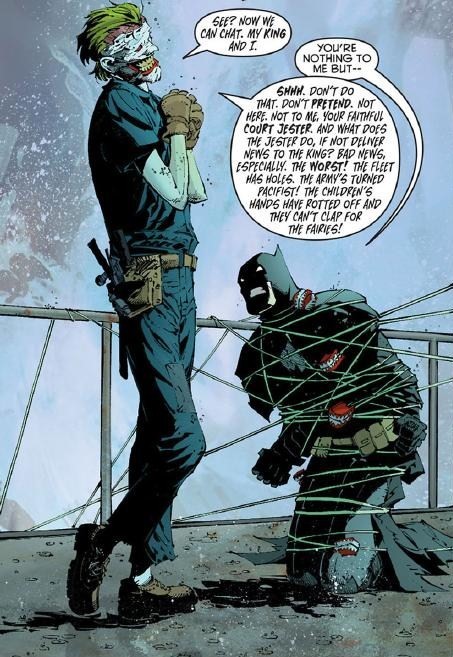
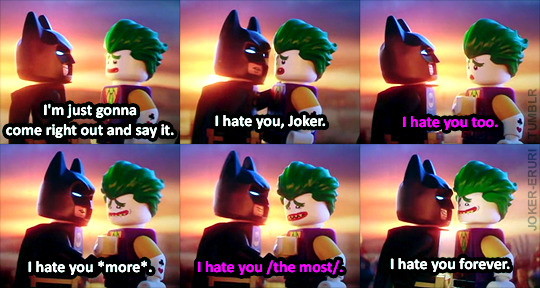
The cinematic versions of Batman always come around to embrace the idea that Batman isn’t the loner that he thinks he is. He travels with gods like Superman and Wonder Woman. In The LEGO Batman Movie, he craves the attention from his peers in the Justice League so badly that he has to put up a front to pretend that he doesn’t want it when he doesn’t get it. In other films, he actually founds the Justice League.
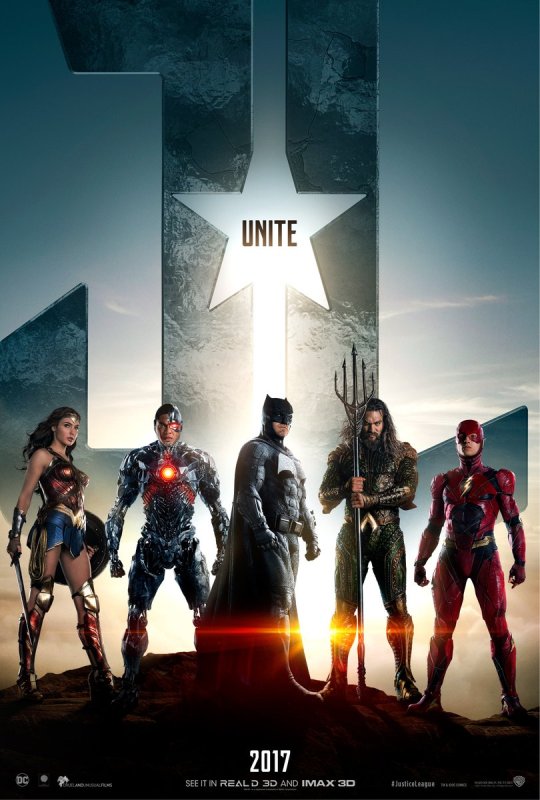
He’s also a father figure, whether in the figurative sense (Batman’s vigilantism gives birth to a more demented class of villains, and his rogues slowly transition from mobsters to supervillains) in a more literal sense (Batman becomes the guardian to the various Robins over the years and the central figure in a cohort of vigilantes, from the Huntress to Spoiler to Red Hood to Batwoman to Batwing). Michael Cera’s performance as Robin in The LEGO Batman Movie makes the character guileless and eager to please than normal to contrast with the bravado that Will Arnett infuses into his Batman.
Like his bald counterpart in The LEGO Batman Movie (coincidentally portrayed by Ralph, another Englishman, Fiennes), Patrick Stewart’s Charles Xavier is concerned that Logan (Hugh Jackman) will lose his chance to reforge a connection to the wider world around him in Logan. Bitter, broken-hearted, and betrayed by his body, Xavier insists to Logan that there is still time for him to reconnect with the world after the rest of the X-Men were killed when Logan meets Laura (Dafne Keen). Logan, Laura, and Charles’s adventure across America remind Logan what a warm household full of affection, as the X-Mansion might have been once, looks like compared to the dusty and solitary existence he, Caliban (Stephen Merchant), and Charles lived in Mexico as he tried to raise enough money to go somewhere so he and Charles can die in peace. As Logan undergoes this journey and reforges connections, he travels from a dusty broken down industrial plant to a neon-bathed city to a corn farm and back to nature, his soul undergoing a revival even as his body continues its breakdown.
Both Logan and Batman begin their films as reluctant fathers, each haunted by loss and unable to figure out the hedgehog’s dilemma. Both are convinced that their lonely lives are the only ways that they can pass their days. Both are pushed by their surrogate father figures to bond with children who unexpectedly enter their lives. And both try to demonstrate their acceptance of the responsibility of fatherhood through sacrifice. Logan overdoses on a drug in order to protect Laura and her friends from a physical avatar of his wild past, while Batman volunteers to return to the Phantom Zone to honor the agreement he made with the Phantom Zone’s keeper that allowed him to return to save his fledgling family.
There’s a thrill to seeing Logan cut a bloody swath across the screen, but the film’s melancholy gives it a bitter taste. The shock of Logan cutting off an arm from a man who was trying to steal the tires from his rented limousine is undercut by how hard it was for the legendary Wolverine to fend off those four men. The excitement of Logan bearing his claws at Donald Pierce (Boyd Holbrook) and the Reavers is undermined by how ineffectual Logan is against them. You might be surprised that Logan is casually murdering Reavers who were trying to capture Xavier, but the surprise is subverted by the realization that the Reavers were completely defenseless and neutralized by Xavier’s psychic seizure. Logan facing down goons to help Will Munson (Eriq La Salle), a farmer that he helped on his journey, but his violence against the Reavers and the goons only brings more violence upon the Munsons, which leaves them all dead. In the climax, Logan is temporarily restored to his former vitality due to a healing serum, but by the end of that burst of violence, Logan can barely stand. Violence in Logan is a bittersweet fruit.
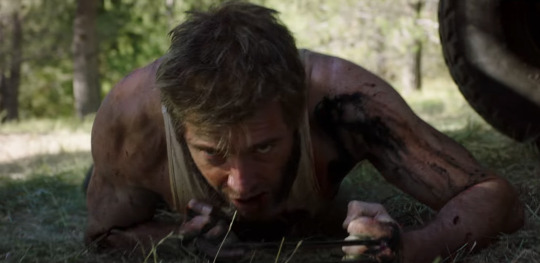
Every time Logan fights the Reavers, they come back with more and stronger soldiers. When he faces them in Mexico, the Reavers have heavily armed Mexican police officers riding in SUVs. By the time that he faces them in North Dakota, the Reavers have armored trucks, jeeps with mounted machine guns, and a young feral clone of Logan. Nonetheless, Logan can’t help but feel fatherly pride during the climactic fight against the Reavers. Laura had already saved him once after he collapsed on the side of a highway by getting him medical attention. But he becomes proud of her when she fights to defend her friends against the Reavers, and they coordinate their attacks. They bond through violence because, as Xavier said, they’re very alike.

The price of violence makes explicit the idea that becoming a parent raises the stakes. One might be tempted to quit an unsatisfactory, unfulfilling, underpaying job, but the income or health insurance from that job might be the only thing that protects your family from deprivation. One might be tempted to lash out at the world or to go it alone, but that might be the selfish thing to do.
James Mangold, the director of Logan and one of the screenwriters, along with Scott Frank and Michael Green, unintentionally struck political relevance in the current political climate. The film’s development began in 2013, and the screenplay was complete by early 2016, around the same time that Donald Trump was campaigning for President of the United States on a platform of xenophobia and racism. In the film’s opening scenes, we see Logan chauffering four young white men past a Mexico-US border checkpoint. They’re standing through the limo’s sunroof, chanting “USA!” at the immigrants waiting to pass the border. By March 2017, President Trump’s administration is floating trial balloons to test the idea of separating women and children who are caught crossing the Mexico-US border together. Laura and her friends are Mexican children whose humanity has been denied by a corporation so they can be experimented upon and trained to be weapons. As Donald Pierce references repeatedly throughout Logan, Laura and her friends are commodities, patented intellectual properties of the company that employs him. Whereas other X-Men stories would be metaphors about how the Other is demonized, here the Other is completely dehumanized. Principal photography for Logan ended in August 2016, but the idea that Laura and her friends are not seeking refuge in the United States because the United States is not a hospitable place for children born from Mexican mothers and the image that they are running toward the Canadian border to seek asylum make for accidentally potent juxtaposition.
While The LEGO Batman Movie and Logan present their protagonists in trigenerational families, The Fate of the Furious presents two different types of families. There’s the circle of friends that become a family that Dominic Toretto (Vin Diesel) often toasts with a bottle of Corona. Then, there’s also the son that he and Elena (Elsa Pataky) created during their relationship when he thought that Letty (Michelle Rodriguez) was dead. Dominic accepts fatherhood without reservation and is willing to betray his la familia in order to protect his biological family until he can find a way to save his son from Cipher (Charlize Theron, mostly underutilized in the film), a legendary cyberterrorist who is blackmailing Dominic to steal an EMP device, a Russian nuclear football, and a Russian nuclear submarine for her.
There is, of course, another father in la familia who is noticeably absent. Brian O’Conner (Paul Walker), Mia Toretto, and their son are written out of the film with a line delivered by Letty to explain that they cannot contact Brian for his help in subduing Dominic and capture Cipher. Within the context of the film, this allows Brian and Mia to raise their child in peace, though I cannot imagine that they would feel much peace watching news reports of the theft of an EMP device in Germany, the assault on a Russian defense minister in New York City, or the chaos in New York when la familia attempted to take Dominic down. Outside of that context, this allows Walker, a father himself, to live on through his character.
With Brian removed, The Fate of the Furious screenwriter has to pile the human pathos on to Dominic, Letty, and Elena, and the film creaks and moans under the pressure. Making Dominic a father certainly raises the stakes for him, and the film is focused only on what becoming a father would mean to Dominic. Unfortunately, the film again can only define Dominic’s fatherhood by his sacrifice of his honor and his betrayal of his familia; the film is completely uninterested in Elena’s experience or perspective as the child’s mother. Because the existence of Dominic and Elena’s son is a shock revelation, there’s no time for them to form a connection or for the viewer to form a connection to them. We feel sympathy for Dominic in theory (one can only imagine the horror of someone holding your child hostage and leveraging them to make you commit crimes and betray your loved ones), but the film tries to split our focus by making us feel the pain from Letty’s perspective as the loved one who is abandoned for unexplained reasons. It’s an attempt to give Dominic a shade of humanity, but it’s done only in abstract.
By comparison, we have a better sense of the surrogate paternal relationship between Mr. Nobody (Kurt Russell) and his trainee, Little Nobody (Scott Eastwood) or between Hobbs (Dwayne “The Rock” Johnson) and his daughter, Samantha (Eden Estrella). Hobbs is a devoted father to Samantha and a committed coach to her soccer team; the cinematic appeal of their relationship lies in Johnson’s charm and their characters’ shared history, which dates back to Furious 7. Even the Nobodies evoke a more real emotional reaction than Dominic and his son because we see how they interact with each other and how Mr. Nobody tries to teach Little Nobody the tricks of the trade.
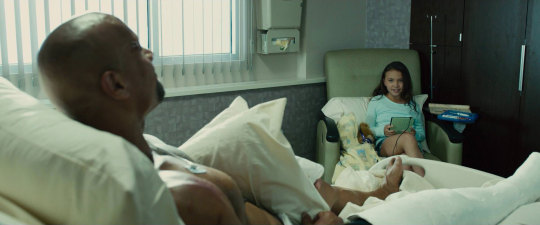
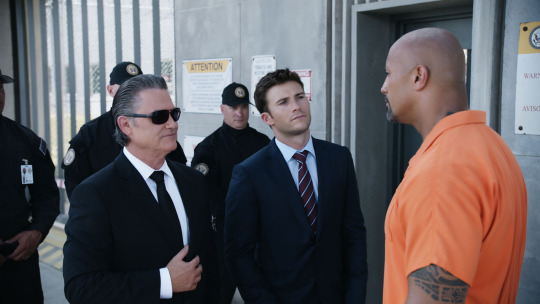
Without the human connection, the spectacle of The Fate of the Furious felt hollow. I should have been wowed by remotely controlled cars barreling through New York City’s streets and raining from parking lots in skyscrapers, but I was bored. I should have been impressed when Dominic and company were racing across ice away from a nuclear submarine, but I was bored and almost nodding off. While the stakes for Dominic as a character were raised with his son’s introduction, the movie itself felt rote, from Cipher’s poorly outlined motivations to a moment that upends the importance of family that is the core of the franchise.
Dominic pays tribute to the bond between his peers that form la familia. However, there is dissonance in the way that Letty, Roman (Tyrese Gibson), and Tej (Chris “Ludacris” Bridges) seemed to have no objection to Deckard Shaw (Jason Statham) joining the team. Shaw murdered Han Lue/Han Seoul-Oh and attempted to kill Dominic, Mia, Brian, and Mia and Brian’s son in Furious 7. Even though Dominic was desperate, contacting Deckard’s mother (Helen Mirren) in order to convince her to persuade Deckard and Owen Shaw (Luke Evans), who has his own disagreeable history with Dominic and company, to save Dominic’s son seemed to betray Han’s memory and to put aside the threats that were made to his family.
The LEGO Batman Movie, Logan, and The Fate of the Furious presented their respective protagonists in non-traditional families. Batman adopts Robin, and they form a trigenerational family with Alfred. Logan becomes Laura’s de facto guardian, and they form a trigenerational family with Xavier. Dominic, Letty, and Dominic’s biological son form a blended family. Indeed, the only traditional nuclear families that we see in these films are the Waynes, which is broken when Batman’s parents are murdered, and the Munsons in Logan.
You could strain to draw a connection between how casually the Munsons are killed to how dystopian the world in Logan is, but the Munsons’ deaths feel almost cruel. From the moment that Logan stops the truck to help them wrangle their horses, the audience begins to wait for the Munsons to die. It gives the otherwise tranquil scenes of Logan, Xavier, and Laura observing what a normal family looks like as they dine together suspenseful tension. Their deaths for doing nothing more than extending hospitality to Logan, Xavier, and Laura felt like a manipulative exercise in cynicism and nihilism. They’re collateral damage in Logan’s violence trap, and the viewer empathizes with Will Munson when he pulls the trigger on Logan after they’ve incapacitated X-24, the younger, feral clone of Logan that was sent to subdue and capture Laura. With his dying breath, Will doesn’t distinguish between X-24 and Logan because they are both monsters that trampled the Munsons’ lives. That the gun’s chamber was empty only emphasizes that violence, even in the cynical world of Logan, isn’t a solution.

Finally, if we accept the notion that becoming a parent is one of the few rites of passage into adulthood left in today’s America, then the other side of that passage is observing your own parents’ decline and eventual death. In Logan, Charles Xavier is suffering Alzheimer’s disease, and Logan and Caliban are Xavier’s sole caregivers. When Xavier doesn’t recognize Logan, he is afraid of him because, to Xavier, Logan is the person who drugs him into unconsciousness. When Xavier is awake and lucid enough to recognize Logan, he berates him for being a disappointment. Xavier’s seizures cause Logan physical pain, and his words cause Logan emotional pain. Xavier is angry at himself and Logan because he needs Logan’s help with something as fundamental as using the bathroom; Logan is resentful for Xavier’s role in the Westchester incident, the physical and emotional pain that Xavier causes him, and the fact that he has to take care of his father figure in his decline.
It was curious to me that three different and big budget films released within two months of each other wove in different ideas about fatherhood into their tales. Each film tried to examine its respective protagonist through the lens of fatherhood and came away with slightly different conclusions. Batman, for as much as he describes himself to be a loner, is character with myriad connections. Logan, another self-professed loner, can’t help but to connect to his daughter when they both do what they do best, even though what they do isn’t very nice and could trap them in cycles of violence. Dominic, a man who talks constantly about his familia, showed that his biological family is ultimately more important to him than the friends and peers around him.
#the lego batman movie#will arnett#michael cera#ralph fiennes#rosario dawson#zack galifianikis#jenny slate#logan#Marvel Studios#warner brothers animation#hugh jackman#patrick stewart#boyd holbrook#dafne keen#eriq la salle#elise neal#the fate of the furious#f8#vin diesel#michelle rodriguez#tyrese gibson#kurt russell#scott eastwood#ludacris#chris bridges#movies#films
7 notes
·
View notes